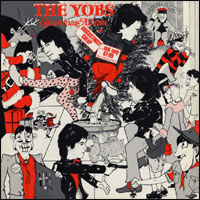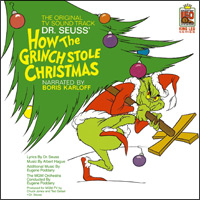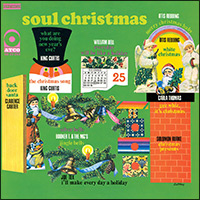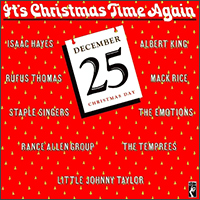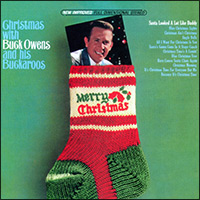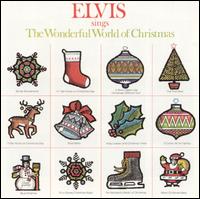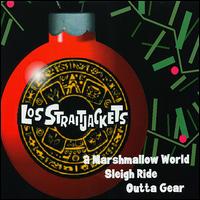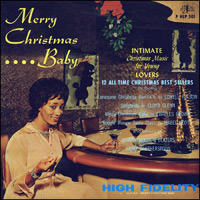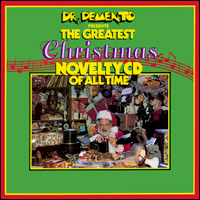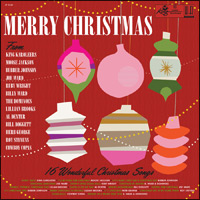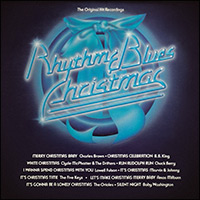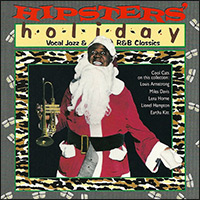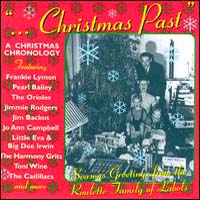
Top 100 Christmas Songs
...and counting
- C-H-R-I-S-T-M-A-S, Yobs (Safari, 1980)
I'll refer you to my discussion of their Christmas Album for greater detail, but the Yobs were a pseudonym for the Boys, an early English punk band. Never a font of maturity and wisdom, the Yobs reached new depths of puerile humor with "C-H-R-I-S-T-M-A-S," and the world was better for it. In my extensive collection of music, I can think of no song more filthy, more disgusting, or more perfect in its utter depravity. One by one, the singer ticks off the nine letters of Christmas, each character of the alphabet representing a body part, sexual act, or venereal disease that made his recent holiday romance particularly memorable and unpleasant. "Christmas comes but once a year," our hapless adventurer concludes with relief, noting wryly, "It makes me fucking sick!" The band caps the sordid affair with a perverted chorus of "Ding Dong! Merrily On High," and, finally, all is calm (though hardly bright).
About half the songs on Christmas Album were released as singles between 1977 and 1979, and then the LP was released by Safari Records in 1980. The album's been reissued several times in the intervening decades, but I'd argue it reached its debauched apotheosis when reissued in 2000 on compact disc (and later for download and streaming) by English punk specialist Captain Oi! It swelled (ahem) to 21 tracks, including a number of non-LP rarities. And, by the way, the Yobs released several more volumes of crass carols, but Christmas Album is the only one you really neeed. I have them all... [back to list] [learn more]
- Santa
& The Satellite (Parts 1 & 2), Buchanan &
Goodman (Luniverse, 1957)
With "Flying Saucer" in 1956, self-proclaimed "King Of The Novelty" Dickie Goodman launched a career that fitfully spanned four decades. It was, to my knowledge, the first-ever "break in" record, a form of humor in which an interviewer (portrayed here by Goodman and partner Bill Buchanan) plays straight man to snippets of recently popular songs. Buchanan & Goodman continued their space age theme - made all the more relevant by the Soviet launch of Sputnik - with "Santa & The Satellite," a wonderfully bizarre holiday treat: Santa is kidnapped by Martians but escapes disguised as Elvis Presley. Later the same year, the duo would release "Santa & The Touchables," a Christmas-flavored sequel to their spoof of TV's The Untouchables, and Goodman would continue to produce break-in records under a variety of names until his death in 1989.
"Santa & The Satellite," however, stands as his best record ever. While it appeared on Rhino's long out-of-print LP, Rockin' Christmas: The 50's, most of Dickie Goodman's records have become sought-after collectibles. In the CD era, Hot Productions released two compilations, Greatest Fables Vol. 1 and Greatest Fables Vol. 2; the first contains his Christmas sides. Later, Rockbeat Records compiled Long Live The King. All of them have nearly disappeared off the face of the earth, but his estate has put a lot of music up for streaming and download. Whatever the case, you'll have to hunt down original vinyl copies to hear the original, unexpurgated versions - i.e. versions with the original artists' recordings of the "answers" to Buchanan and Goodman's questions. [back to list]
- You're A Mean One Mr. Grinch (from “How
The Grinch Stole Christmas”), Thurl Ravenscroft (Mercury, 1965)
Like many of you, my fondest Christmas memories are inextricably tied to a series of now-classic TV specials that featured some particularly strong music. These include Rudolph The Red-Nosed Reindeer (1964, score by Johnny Marks, vocals by turncoat folkie Burl Ives); A Charlie Brown Christmas (1965, featuring the jazz stylings of Vince Guaraldi); Frosty The Snowman (1969, in which Jimmy Durante reprises his charming 1950 version of the title tune); Santa Claus Is Coming To Town (1970, with Fred Astaire serving as storyteller and emcee); and A Year Without A Santa Claus (1974, best remembered for the gleefully malevolent "Heat Miser").
When it came to selecting songs for my Top 100, however, nothing topped "You're A Mean One Mr. Grinch," an unforgettable tribute to one of Dr. Seuss' most memorable creations, How The Grinch Stole Christmas (1966). For me, the rosy spectacles of memory had softened the truth, and when I first listened to the song in the cold light of adulthood, I was shocked: The Grinch was one bad dude! Ominously voiced by one Thurl Ravencroft (not narrator Boris Karloff as I had always supposed), we learn that Mr. Grinch's "brain is full of spiders," he has "termites in his smile," and his "soul is an appalling dump heap, overflowing with the most disgraceful assortment of deplorable rubbish imaginable" - certainly not the plush toy presented in recent years! Though the complete soundtrack has been reissued, I recommend Nickelodeon's Classic Cartoon Christmas series (read about it), containing highlights from all the TV shows listed above. [back to list] [learn more]
- Christmas Wrapping, Waitresses (Ze, 1981)
By the early 80's, it was OK to be a nerd (thank you, David Byrne). The Waitresses made something of a career out of exploring the lives of nerds, first with the theme of Square Pegs, a short-lived sitcom, then with "I Know What Boys Like," a sneering portrayal of the ultimate nerd (a horny male) as told by a woman (or prick tease, depending on one's perspective). "Christmas Wrapping" fits this theory as well, only this time the insecure party is female and the story turns out well.
For the protagonist in the "Christmas Wrapping," the holy season was just an excuse to get laid. Employing a charming pseudo-rap style (think Blondie-meets-Tom Tom Club), singer Patty Donahue begins with a resounding "Bah humbug!" After a year of missed romantic opportunities, though, she runs into "that guy I've been chasing all year" while doing some last-minute shopping."Christmas magic's brought this tale to a very happy ending," she effuses, not unlike those Revenge Of The Nerds movies. It sounds like her stocking is going to get stuffed!
"Christmas Wrapping" was the most popular song from ZE Records' A Christmas Record, a very hip 1981 LP that's only been reissued on CD overseas, though it's widely available for download and streaming. However, the song often shows up on compilations like The Edge Of Christmas and is included on the group's fine Best Of The Waitresses. In 1982, "Christmas Wrapping" was issued as a 12-inch single, and this later showed up online, including the unhinged non-LP b-side, "Hangover 1/1/83." [back to list] [learn more]
- Gee Whiz, It's Christmas, Carla Thomas (Atlantic, 1963)
Before the rise of Aretha Franklin, Carla Thomas was often referred to as the Queen of Soul, but she didn't score many Top 40 pop hits during her long tenure with Stax and Atlantic Records. "Gee Whiz Look At His Eyes," however, reached a solid #10 in 1961 at the very start of her career. Not surprisingly, she revisited the theme for her Christmas single a few years later, and it made the charts as well, peaking at #23 on Billboard's Christmas chart in 1963. A charming slice of fluffy soul, "Gee Whiz, It's Christmas" mixes coy, girl group innocence with Thomas' distinctly mature sexual yearning. I should point out, as well, that this "Gee Whiz" was an entirely original composition (written by Thomas with MG guitarist Steve Cropper), and not a retread of her earlier hit.
"Gee Whiz, It's Christmas" was originally released as an Atlantic single backed with "All I Want For Christmas Is You," an original ballad written by A.C. William, who also wrote the blues standard "Oh, Pretty Woman" for Albert King. "Gee Whiz, It's Christmas" would be included on Atco's classic Soul Christmas compilation in 1968, and then "All I Want For Christmas Is You" would be added to the 1994 CD reissue known as The Original Soul Christmas. Thomas would record "All I Want For Christmas Is You" again for Stax in 1966, and that version can be found on Atlantic's 1991 revision of Soul Christmas, as well as The Complete Stax/Volt Singles 1959-1968. And then, all three of those recordings are found on Let Me Be Good To You: The Atlantic & Stax Recordings (1960-1968).
As if all that weren't confusing enough, Thomas recorded both sides yet again in 1979 as a single for budget label Gusto Records. I'd argue these are demonstrably inferior versions, but Thomas was still a singer of great skill and power - so completists might want them, too. They pop up on Gusto's general shoddy compilations like Rhythm & Blues Christmas and 24 Greatest R&B Christmas Hits alongside vintage material from the vaults of Hollywood, Swing Time, and King Records. [back to list] [learn more]
- I'll Be Your
Santa Baby, Rufus Thomas (Stax, 1973)
Whereas his daughter, Carla, usually worked a smooth, sultry groove, Memphis soul man Rufus Thomas was always loud, proud, and funky - and frequently comical. All four characteristics are abundantly evident on "I'll Be Your Santa Baby," a bawdy workout released as a Stax single in 1973. As the horns mockingly toot Christmas carols and the band lays down a dirty backbeat, Rufus hollers "Here comes Santa Claus," giving the distinct impression he ain't talking 'bout no sleigh ride. Sexual innuendo abounds throughout, beginning with this deathless verse: "I'll slide down your chimney and bring you lots of joy, what I got for you, mama, it ain't just a toy." From there, Rufus makes a sly (and rare, in the phallocentric pop world) reference to the clitoris: "This Christmas you'll remember, I'll make sure of that, 'cause this Christmas, mama, I showed you where it was at!" Thomas, actually, seems almost as concerned with duration as he is with the performance itself: "When the New Year rolls around, you'll still be askin' for more," and Rufus won't quit till the job is done - "till 1984," actually. Now that's staying power!
"I'll Be Your Santa Baby" was first compiled on Stax's It's Christmas Time Again (1982), which claims in its liner notes that the song was previously unreleased. It was not. Subsequently, it's shown up frequently on albums like Christmas In Soulsville (2007) and Christmas A Go-Go (2008), as well as The Complete Stax/Volt Singles Vol. 3: 1972-1975 (1994). The single's original b-side, the infinitely more gentle "That Makes Christmas Day," first popped back up on Christmas In Soulsville billed as a duet between Rufus and Carla. It's not, really, but they did write the song together, and that's probably Carla singing background vocals. The Soulsville master, by the way, is nearly a full minute longer than the original 45 version, which can be found on The Complete Stax/Volt Singles Vol. 4 (2018). [back to list] [learn more]
- Christmas In Jail,
Youngsters (Empire, 1956)
The Youngsters nearly take the prize for worst Christmas ever with "Christmas In Jail." I'd argue that they come in second only to Ron Holden, who gets sent to the electric chair for Christmas! Anyway, guilty of overindulging at the office party ("I was in the wrong lane feeling no pain"), our hero gets locked in the hoosegow for the holidays. He'll be staying there through New Year's with only bread and water to drink - indeed a bummer, which makes "Christmas In Jail" a highlight of Rhino's Bummed Out Christmas (1989), a compendium of holiday musical mishaps. By modern standards, this doo wop ditty could be considered horribly incorrect politically. On the other hand, the hapless adventurer gets his due and swears, "Ain't gonna drink and drive no more." If anything, "Christmas In Jail" is a morality play set to a rockin' beat - sounds correct to me!
The Youngsters were a vocal group from Los Angeles, California, and "Christmas In Jail" was first released as a single (which did not chart) on Hollywood-based Empire Records, whose main claim to fame was releasing a few records by Richard Berry, who wrote and recorded the song "Louie Louie" for Flip Records, another Hollywood label, about the same time. The Youngsters recorded four singles for Empire, as well as one each under the names the Tempters and the Preludes, all in 1956. "Christmas In Jail" also appeared on Rhino's groundbreaking Rockin' Christmas series (read about it), but since Bummed Out Christmas, it's mostly been relegated to European public domain collections like Blues, Blues Christmas Vol. 3. [back to list] [learn more]
- Santa Looked A Lot Like
Daddy, Buck Owens & His Buckaroos (Capitol, 1965)
In short order, Buck Owens recorded two Christmas albums, Christmas With Buck Owens & The Buckaroos (1965) and Christmas Shopping (1968), consisting almost exclusively of original songs, most written by Owens and/or Buckaroo guitarist Don Rich. "Santa Looked A Lot Like Daddy" (from the first album) is the best of the bunch, and it's prime Bakersfield country - twangy, energetic, and brimming with attitude. In this case, that attitude services a wry joke - a twist on "I Saw Mommy Kissing Santa Claus" - but it's a hoot all the same. Young Buck witnesses some hanky panky between his mama and a suspiciously skinny Santa. "If Santa Claus ain't Daddy," he resolves, "Then I'm a-gonna tell on them!"
"Santa Looked A Lot Like Daddy" was also released as a single, and it nearly topped Billboard's Christmas chart, peaking at #2, then reaching #18 two years later. The albums themselves have been reissued many times in all formats, but Omnivore's 2020 reissue of Owens' 1970 compilation A Merry Hee Haw Christmas merits special mention. The original two-LP set - released to capitalize on Owens' popular-but-cornpone TV show, Hee Haw - included nearly all the songs from Owens' two holiday albums. Omnivore's CD version restored the rest of those songs, plus two "Toys for Tots" bonus tracks. Or, as Buck's little boy told Santa in another song, "One of everything you got"... "Santa Looked A Lot Like Daddy" also appeared on Rhino's sterling Hillbilly Holiday (read about it) along with "Christmas Time's A-Comin'", another crackling track from Christmas With Buck Owens. [back to list]
- If I Get Home On Christmas Day,
Elvis Presley (RCA, 1971)
In 1971, Elvis Presley was still riding high on the wave of success that followed his storied '68 Comeback' NBC-TV special and From Elvis In Memphis LP. Ironically, the TV show was supposed to have been a Christmas special, envisioned by Col. Tom Parker as a traditional holiday offering to placate the fans. For once, Elvis rebelled against the Colonel's unimaginative leadership, and the result was an electrifying return-to-form for the King Of Rock 'n' Roll. When Presley recorded Elvis Sings The Wonderful World Of Christmas, the malaise that eventually led to his death was beginning to take its toll, but he was still selling millions of albums and concert tickets and, more importantly, was still capable of uncorking amazing performances when the muse inspired him.
The emotional centerpiece of Wonderful World Of Christmas, "If I Get Home On Christmas Day" is just such a moment, centered around what critic David McGee claimed "may well be the King's best recorded vocal." Written by British producer/songwriter Tony Macaulay, "If I Get Home On Christmas Day" is pristine 1970's studiocraft, understated in a way that Elvis' best work rarely was. For instance, the incendiary "Merry Christmas Baby" on the same album was wonderful, but it's drawn in bold, almost caricatured strokes. On "If I Get Home On Christmas Day," Elvis is, for once, an adult, with all the passion and ambiguity that condition portends.
Wonderful World Of Christmas has been reissued many times, and all or most of the album has been included on several fine Elvis Christmas compilations starting with If Every Day Was Like Christmas (1994). In addition, the whole album also appears on Elvis' 2021 boxed set, Back In Nashville, but presented with undubbed, unedited masters. [back to list] [learn more]
- A Marshmallow
World, Los Straitjackets (Spinout, 1996)
Until recently, the world of instrumental Christmas rock was dominated by The Ventures' Christmas Album, a 1965 LP that gained such status for a variety of reasons, some valid (it rocks!) and some coincidental (how many instrumental Christmas rock records can you name?). The 2002 release of 'Tis The Season For Los Straitjackets (Yep Roc Records) helped change that situation, giving the Ventures' classic a run for its money and providing reverb junkies with a high-powered fix. The best song on the album, "A Marshmallow World," was actually recorded six years earlier for a red vinyl single (backed with "Sleigh Ride") and was also released by Upstart Records on a promotional CD single (pictured). With its pounding drums, incessant sleigh bells, and chiming melody, "A Marshmallow World" announces a Christmas celebration without the band uttering a syllable.
Since then, Los Straitjackets have proven themselves a very Christmas-friendly band. They released another album, Yuletide Beat (2009), and a single, "Hark! The Herald Angels Sing" (2011), and they backed their good buddy, Nick Lowe, on his album, The Quality Holiday Revue Live (2015). In 2018, they released Complete Christmas Songbook, which collected it all, and after that Lowe and the 'Jackets teamed up for yet another single, "Winter Wonderland" (2020). [back to list] [learn more]
- The Christmas Song (Chestnuts
Roasting On An Open Fire), King Curtis (Atco, 1968)
As a solo artist ("Soul Twist," "Memphis Soul Stew") and session man (Coasters, Sam Cooke, Aretha Franklin, John Lennon, and many others), saxophonist Curtis Ousley earned the title of "King" by popular acclaim. For the all-time classic album, Soul Christmas (Atco, 1968), the King wisely chose two holiday standards - songs for which lyrics had become superfluous. Inarguably, "The Christmas Song (Chestnuts Roasting On An Open Fire)" is one of the most recognizable modern Christmas ballads, recorded thousands of times since it was written by Mel Tormé and Robert Wells in 1945 and immortalized by Nat King Cole in 1946. King Curtis' take on the song is a monumental act of seduction, extending the romantic subtext of the lyrics to highly erotic levels. No words are spoken here, but Curtis' smooth tenor saxophone speaks volumes, beckoning lovers the world over to new heights of passion.
Curtis' reading of Frank Loesser's "What Are You Doing New Year's Eve" very nearly equaled "Christmas Song" in sensual firepower, and the two songs were also released as a single. Perhaps not too surprising in a year dominated by assassinations, riots, and war, it failed to dent the charts. By the way, that's Duane Allman playing guitar on both songs. Curtis didn't give him a lot to do, but he takes a pithy solo in "What Are You Doing New Year's Eve." [back to list] [learn more]
- I'll Make Everyday Christmas
(For My Woman), Joe Tex (Dial, 1967)
Kindly Joe Tex swung wildly throughout his career between reverent romantic sermons ("Hold On To What You've Got," "Sweet Woman Like You") and boisterous comic goofs ("Skinny Legs And All," "I Gotcha"). "I'll Make Everyday Christmas (For My Woman)" was squarely in the former camp as Joe takes the menfolk to church, preaching that they should make every day as special as a holiday for the women they love. The solemn organ, Joe's slowly building fervor, and his homespun homilies conspire to shame all but the most devoted husband. "There'll be times when I won't be able to afford a piece of mistletoe," sings Joe, "but I'll kiss her so sweetly, and I'll hold her so gently, that she won't even know."
"I'll Make Everyday Christmas (For My Woman)" was first released as a single in 1967, when it reached #15 on Billboard's Christmas chart. It was included the following year on Atco's monumental Soul Christmas, where it contrasts sharply with carnal odes like Clarence Carter's "Back Door Santa" (another Top 100 Song). That dichotomy of sin and salvation has long been the essence of gospel music, the foundation upon which soul music is built, and Joe Tex's song is gospel in all but name. [back to list] [learn more]
- Who Took The Merry Out
Of Christmas, Staple Singers (Stax, 1970)
Like many of the Staple Singers' best songs, "Who Took The Merry Out Of Christmas?" is thinly disguised gospel that traffics in down-home wisdom for the masses. So thinly disguised, in fact, that only mere spelling ("Merry" versus "Mary") makes the song's intention less than explicit. Once a listener gets past the label and down in the grooves, though, all such artifice disappears, and Mavis and family commence to preachin'. Folks are so "busy having fun, drinking with everyone" that they've begun to treat Jesus like he's "just another baby boy." A little too sanctimonious for my taste, but the steamin' Stax stew and the Staples' spirited harmonies more than redeem the record (if not my soul).
"Who Took The Merry Out Of Christmas?" was written by Stax staffer Deannie Parker and produced by Al Bell, who later took ownership of the storied Memphis label. It was first issued as a non-LP Stax single in 1970, but it did not chart. It was reissued in 1972, but it did not chart until 1973, when it reached #2 on Billboard's Christmas chart. It was first collected on Stax's It's Christmas Time Again (1982) and has since been anthologized many times, including on Bummed Out Christmas! (1989), Smooth Grooves: A Sensual Christmas (1999), and Christmas In Soulsville (2007), as well as Complete Stax/Volt Singles Vol. 2: 1968-1971 (1993). [back to list] [learn more]
- Lonesome Christmas, Lowell
Fulson (Swing Time, 1950)
The pop music industry - including its rhythm & blues sector - has always eaten itself, recycling records, songs, and riffs for quick commercial gain. Singer and guitarist Lowell Fulson's "Lonesome Christmas (Parts 1 & 2)" is a case study in this practice. Originally recorded for Swing Time Records in 1950, it reached #7 on Billboard's R&B chart and was reissued every Christmas for several years until the label was sold to Hollywood Records. Hollywood reissued the song as "The Original Lonesome Christmas" in 1955, and Fulson subsequently recorded the song numerous times, including as "I Wanna Spend Christmas With You" for Kent Records in 1967, in a funky version for Jewel Records in 1970 - which I actually prefer to the original - and for Rounder Records late in his career.
Confusing, but none of that detracts from Fulson's good-humored blue yule, which finds him hoping to spend Christmas "drinking eggnog with fruitcake" with his lovely intended. The original version is available on Hollywood's Rhythm And Blues Christmas, the Kent rewrite is collected on Virgin's Best Christmas Ever, the Jewel rerecording was compiled by Varese on Merry Christmas Baby, and the Rounder version can be found on Bulleye Blues Christmas. [back to list] [learn more]
- All I Want For Christmas
(Is My Two Front Teeth), Spike Jones & His City Slickers (RCA Victor, 1948)
Spike Jones' standard operating procedure was to satirize existing songs. Particularly during the 1940's, the story wasn't really finished for a big hit record until Jones and his City Slickers destroyed it. "Cocktails for Two," "Hawaiian War Chant," "Mule Train," "Tennessee Waltz," and "Holiday For Strings" were among his many targets. Bells, whistles, sirens, and other clattering sound effects combined with the Slickers' truly twisted musical vision to create records that transcended novelty, reaching dizzying heights of inspired lunacy. See Spiked: The Music Of Spike Jones (1994) for a deep dive into the City Slickers' warped virtuosity, including their epic 1945 assault on "The Nutcracker Suite."
By far, however, Spike Jones' biggest hit was an original tune, "All I Want For Christmas (Is My Two Front Teeth)," which topped the pop charts for three weeks in 1948. Ironically, Jones quickly found himself the target of cover versions by Nat King Cole, the Andrews Sisters, Danny Kaye, and others. None, however, could match Spike's gleefully mocking treatment of the whistling, gap-toothed youngster - sung by City Slicker George Rock - who gets nothing for Christmas because Santa can't understand him. The song was written in 1944 by a school teacher, Donald Gardner, and first recorded by the City Slickers in December 1947 - though not issued until November 1948. It can be found on many Christmas compilations, including Dr. Demento Presents The Greatest Christmas Novelty CD Of All Time (1989) and The Most Fabulous Christmas Album Ever! (1999), as well as Musical Depreciation Revue: The Spike Jones Anthology (1994) and Spike Jones' Greatest Hits!!! (1999).
In the wake of his "Two Front Teeth" triumph, Jones recorded a lot more holiday music, most of it aimed squarely at the children's market and none of it as off-kilter as his signature hit. That said, "Happy New Year," the original b-side of "Two Front Teeth" is well worth tracking down. If anything, it is more typical of the City Slicker's usual mayhem, and it can be found on the aforementioned Musical Depreciation Revue, as well as Dr. Demento Presents Holidays In Dementia (1995). In 1956, Jones recorded a new, far less interesting version of "Two Front Teeth" for his album Presents A Xmas Spectacular, which was weighed down by a heavy quotient of silly kiddie songs and genuine muzak. The album has been reissued many times, including as Let's Sing A Song Of Christmas and It's A Spike Jones Christmas. [back to list]
- Nuttin' For Christmas, Joe Ward (King, 1955)
"Nuttin' For Christmas" is a yarn of juvenile comeuppance penned by veteran songwriters Sid Tepper and Roy C. Bennett, who had previously written pop hits like "Red Roses For A Blue Lady" and "The Naughty Lady Of Shady Lane." Later, they would churn out a lot of fodder for Elvis Presley during his endless soundtrack days, most notably songs for King Creole (1958), G.I. Blues (1960), and Blue Hawaii (1961). But, "Nuttin' For Christmas" is perhaps Tepper and Bennett's biggest hit, if only because it's been recorded innumerable times. In 1955, no less than five versions charted, including records by Barry Gordon, the highest charting record, and Stan Freberg, in a hilarious variation featuring cartoon legend Daws Butler.
But, for my money, none bested youngster Joe Ward for sheer sass. Ward was the eight-year-old star of NBC's Juvenile Jury (discovered by Steve Allen), and his "Nuttin' For Christmas" barely scraped the Top 20, while Gordon's cuter, less insolent rendition rose all the way to #6. It was Ward, though, who sold the song's central premise most convincingly. The singer isn't upset so much that there would be no bounty under the tree. Rather, he's pissed that somebody "snitched" on him and he got caught! You can almost see young Ward's tongue poking out in snotty defiance as he brags, "I ain't been nuttin' but bad!" It matters little that his transgressions are slight by modern standards ("I filled the sugar bowl with ants"). This brat is rotten to the core, and we are thrilled to see his Christmas wishes thwarted.
Joe Ward's original recording was issued by King Records as a 7-inch single backed with "Christmas Questions," and it was never reissued on a legitimate CD - though it appeared on a few public domain releases like Jasmine's Christmas In The Air! Television Stars Ring In The Holidays (2015). In 1959, both sides of the single appeared on a King compilation LP, and that was reissued on green and red vinyl in 2019 as Merry Christmas From King Records. Oddly, the album was also released to streamers like Spotify and YouTube, but not to digital retailers like Amazon and Apple Music. [back to list]
- It's Christmas, Marvin & Johnny
(Aladdin, 1958)
The first ever Christmas reissue - in the modern sense of the word - came in 1976 when United Artists compiled Rhythm & Blues Christmas, a 10-song LP containing seven songs on my Top 100 plus three that barely missed the cut (read about it). Marvin & Johnny's "It's Christmas" was a failed Aladdin 45 released in 1958, and it was literally rescued from obscurity by Rhythm & Blues Christmas. The song's confident tempo and easy harmonies made it a welcome discovery, even if the lyrics didn't break new ground, mostly trading in all the usual Christmas clichés.
Though often lumped in with the doo woppers, Marvin & Johnny sang as one voice and professed their devotion with gospel-like feeling. In doing so, they clearly set the stage for later soul duos like Sam & Dave and James & Bobby Purify. Marvin & Johnny are best remembered for songs like "Baby Doll" (#9 R&B, 1953), "Tick Tock" (#9 R&B, 1954), and "Cherry Pie," the b-side of "Tick Tock" that later became a major pop hit for Skip & Flip (#11, 1960). But, it's worth noting that the duo was comprised of two different Marvins and several different Johnnys over the years. "It's Christmas" was written by Marvin Phillips, who founded the group with Johnny Dean. But, "It's Christmas" probably features Emory Perry in the role of "Johnny," though no truly authoritative source confirms that. It's also worth noting that the original Aladdin release is titled "It's Christmas Time," but most reissues - including Rhythm & Blues Christmas and Rhino's Rockin' Christmas: The 50's - truncate the title to "It's Christmas," which is what the duo usually sings. The song is also found on EMI's Legends Of Christmas Past, one of its few legitimate CD appearances. [back to list] [learn more]
- Another Lonely Christmas, Prince (Warner Brothers, 1984)
Prince was one of the world's most celebrated artists when he released "Another Lonely Christmas" as the non-LP b-side of "I Would Die 4 U," a Top 10 single from the film Purple Rain (1984) - the soundtrack of which is generally acknowledged as his artistic zenith. "Another Lonely Christmas" is a melodramatic ballad cut from the same cloth as other Purple Rain productions, stuffed with pealing guitars and multi-layered vocals. The indulgent lyrics teeter on the precipice of self-parody, but Prince sells the song with his most redeeming trait - his unquestioning self-confidence. It matters not that he's telling a silly tale - after his girlfriend dies in a car crash, the Purple One issues the deathless threat to "drink banana daiquiris till I go blind." When he reaches his squalling crescendo of catharsis, we feel every bit of his pain, and that shared experience is what pop music is all about.
Though "Another Lonely Christmas" wasn't in the Purple Rain film or on the soundtrack album, it reached #5 on the Billboard Christmas charts in 1984. The song grew scarce for a while, though. It showed up on a Warner Brothers vinyl promotional album called Yulesville in 1987, but it has never been included on a commercially released Christmas record (at least, not in America).
Thankfully, Prince included the 7-inch edit of "Another Lonely Christmas" on his own incredibly awesome three-disc retrospective, The Hits/The B-Sides (1993). An extended version of "Another Lonely Christmas" was released on the 12-inch vinyl single of "I Would Die 4 U," but it wouldn't be reissued until both the 7- and 12-inch versions were included as bonus tracks on the 2017 expanded edition of Purple Rain. [back to list]
- Christmas Spirits, Julia Lee & Her Boy friends (Capitol, 1948)
Walking a fine line between jazz and blues, Julia Lee & Her Boy Friends recorded one of the finest of innumerable variations on the timeless theme of having the blues - and feeling horny - at Christmas time. "Christmas Spirits," their ribald 1948 classic for Capitol Records, begins with the band creating raucous party noises, but then Lee enters with the most abject of lines. "Christmas spirits all around me, but I just don't feel a thing," she insists, but the raw, unrequited sexual need (and bawdy humor) Lee injects into her understated performance is remarkable. Aware that Santa can't bring her what she needs most (wink, wink), she resorts to flirting with the Fat Man himself. "I could go for your long" (pausing wickedly) "whiskers," she purrs, then invites Santa to drop by when his work is done. Christmas might not be so blue after all!
In her day, and particularly in her hometown of Kansas City, Julia Lee was a popular and versatile pianist and vocalist who specialized in risqué songs like "Christmas Spirits." She is best remembered for her skills with the sexual double entendre, including songs like "Snatch and Grab It" (1947), "King Size Papa" (1948), and "My Man Stands Out" (1950) recorded during her tenure for Capitol from 1944 to 1952. "Christmas Spirits" was recorded in 1947, but not released until 1948, and it charted in early 1949, peaking at #14 on Billboard's R&B chart. Lee's Boy Friends on this session included stellar saxman Benny Carter and trombonist Vic Dickenson, whose sultry solo is a sleazy highlight.
"Christmas Spirits" has been anthologized many times, starting with Rhino's Hipsters' Holiday: Vocal Jazz And R&B Classics (1989) and EMI's Christmas Kisses: Christmas Classics From Capitol's Early Years (1990). Note that the title is sometimes listed as "Christmas Spirit" and "Christmas Blues" (though neither is correct), and the band's name is often spelled the modern way, Boyfriends. [back to list]
- What Are You
Doing New Year's Eve? Orioles (Jubilee, 1949)
Not many great pop songs have been written about New Year's, and "What Are You Doing New Year's Eve?" is undoubtedly one of the best. Penned by songwriting legend Frank Loesser, it is certainly the second-most-recorded New Year's song after "Auld Lang Syne." Sonny Til & The Orioles' mellifluous proto-doo wop rendition is my favorite version, and it's part of one of the greatest Christmas singles ever. It was released in 1949 with "(It's Gonna Be) A Lonely Christmas" - another Top 100 Song, originally issued in 1948 - on the flipside. Between the front and back sides, the single tells a little story. After spending a lonely Christmas in the throes of depression, our hero ventures out, seeking redemption at midnight, December 31, on the lips of his lost love. "Maybe I'm crazy," he posits, "but just in case I stand a chance, here's that jackpot question in advance." We're rooting for you, Sonny, but your track record ain't so hot....
Both "What Are You Doing New Year's Eve?" and its b-side can be found on Rhino's Doo Wop Christmas (1992), as well as Christmas Past (1998), a collection of holiday sides from the Roulette family of labels. [back to list]




